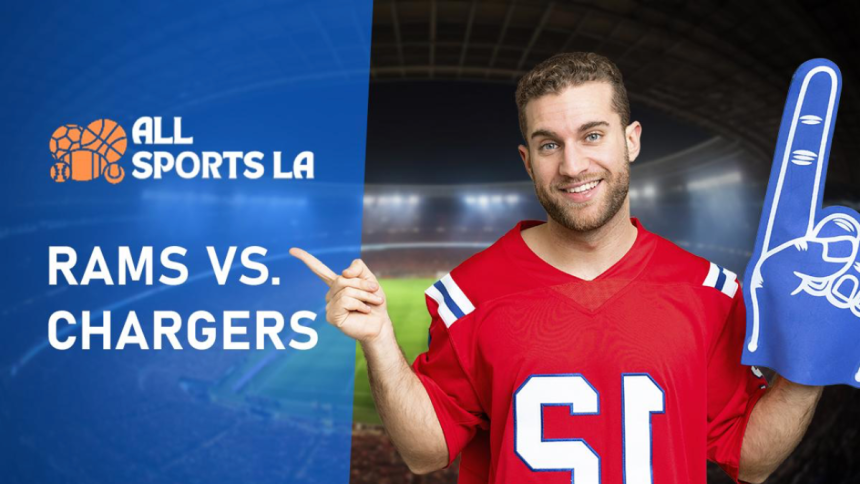Los Angeles has been home to two NFL teams simultaneously since 2016-2017: the Rams (Rams) and Chargers (Chargers). Both share the state-of-the-art SoFi Stadium, but the battle for the attention and loyalty of local fans is in full swing. allsportslafilmfest.com tells you how the rivalry stacks up.
The Return to Los Angeles and the Start of the Standoff
The Rams team returned to Los Angeles from St. Louis in 2016, soon winning the Super Bowl in their home stadium. The Chargers moved from San Diego in 2017. Both teams now play at SoFi Stadium, but their histories in LA are vastly different. The Rams had a long history in Los Angeles in the mid-20th century, while the Chargers were leaving their native San Diego for the first time and trying to win over new audiences. These circumstances formed different starting positions in winning over the city’s fans.
Los Angeles Fan Bases
Los Angeles is the second most populous city in the United States and is very culturally diverse. Research confirms that the Rams attract more ticket sales on average: data from Vivid Seats showed the Rams outpacing the Chargers in terms of share of sales in the city’s various ZIP codes, while the Chargers have long looked like “guests” in foreign territory. When the Rams returned in 2016, their fan base worked quickly, selling tens of thousands of season tickets in a matter of hours. The Chargers, on the other hand, faced difficulties: the first seasons after the move were characterised by low season ticket sales and rivals filling the stadium instead of home fans.
Nevertheless, both clubs showed high attendance. In the 2021 season, the Rams averaged 71,000 spectators, while the Chargers averaged about 70,000 at a home game.
Factors Influencing Fan Preference
Several key aspects determine which team LA residents will support:
- History and success. The Rams have been quick to win titles: going to and winning the Super Bowl has made them a “championship team” and strengthened their connection to the city. The Chargers, on the other hand, have yet to achieve major playoff success since moving, making it difficult to attract fans, especially without a previous historical attachment to LA;
- Game Performance. In-season successes and playoff appearances are eye-catching: the Rams have regularly made the playoffs in recent years, while the Chargers have only rarely had a competitive season. If the Chargers can get stronger and produce consistent results, interest will increase;
- Images of key players. Celebrity personalities affect popularity. The Rams have Matthew Stafford, Davontae Adams and a strong defence create an image of a team with great potential. The Chargers have young quarterback Justin Hebert with a loyal audience, but no major playoff accomplishments yet. The attractiveness of players and their charisma influence the likes of different demographic groups in Los Angeles;
- Cultural and social identity. The Chargers emphasise their connection to former San Diego fans and the multiculturalism of the region, aiming to attract Hispanics and neighbouring counties. The Rams, on the other hand, are leveraging a long history in LA and a broader marketing campaign, building on the success and prominence of coach Sean McVay;
- Marketing and media presence. Both clubs invest in advertising, events and activity in the city. However, the Rams, as a championship team, have more media weight, which attracts a wide audience. The Chargers try to compete, but the scale and resources of the Rams are often greater.
SoFi Stadium’s Atmosphere and Shared Games
SoFi Stadium, shared by both teams, simultaneously creates both a sense of a unified LA football centre and a heightened comparison. Fans often attend not only their own games, but also rival games for the sake of atmosphere. That being said, it is noticeable in the stadium that Rams games are more likely to have their colours and paraphernalia present, whereas Chargers games sometimes see many fans of other teams coming to watch football in general.
Sharing an arena also means competition for the best game slots, events and sponsorship activities. Each team tries to stand out: organising fan zones, special shows, and events outside of matches. These efforts are aimed at strengthening fan attachment and creating a club culture.
Current Trends and Perspectives
According to polls, Rams fans are considered among the most optimistic and engaged for the 2025 season. The Chargers, despite starting difficulties, show an increase in interest, especially if their success improves in the regular season and playoffs. In 2024-2025, the Chargers have strengthened their roster and improved their defence, which could make them more competitive and attract new fans.
The Rams continue to maintain a high level: strong team, consistent performances, big names. This solidifies their position as LA’s “premier” team. But things change in sports: if the Chargers manage to have a breakthrough and regular success, they can pull some of their audience over to them.
The Emergence of a Dual Fandom

Interestingly, many LA residents support both teams – a “dual-fandom” phenomenon. People pick one team to bet on in the NFC and another for the AFC, following both. These fans are less sensitive to the “battle” and more appreciative of the opportunity to cheer for teams in different conferences. This phenomenon makes it easier for two teams to exist in the same market.
How the Battle Stacks Up Today
At this point, the Rams are considered more popular and successful in LA. The Chargers continue to grow, but they have yet to gain the trust of a wide audience through results and active community engagement. Nevertheless, the competition is useful: it encourages both teams to develop infrastructure, offer fans new event formats, and improve the experience in the stadium and online.
Conclusion
The fight between the Rams vs. Chargers for the football hearts of Los Angeles is not just a sporting confrontation, but a reflection of a complex football background where history, success, marketing and cultural sensitivities come together. While the Rams maintain their lead through historical ties and accomplishments, the Chargers have a chance to ride the wave if they achieve serious playoff success and strengthen their connection to the community.
Lynn Martelli is an editor at Readability. She received her MFA in Creative Writing from Antioch University and has worked as an editor for over 10 years. Lynn has edited a wide variety of books, including fiction, non-fiction, memoirs, and more. In her free time, Lynn enjoys reading, writing, and spending time with her family and friends.















